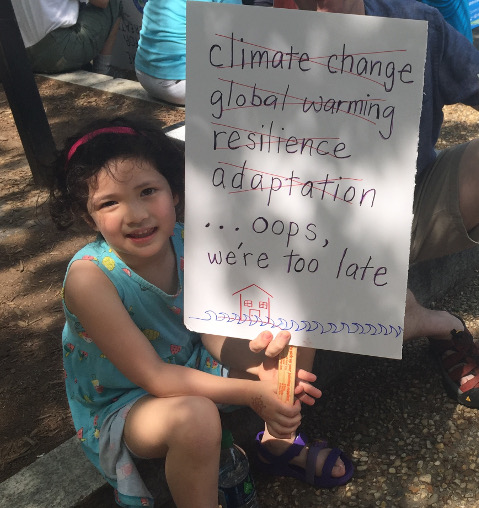Yes, March for the Climate
But What Actions Will Affect This Defining Issue of Human History?

Thirty one years ago, I took an overnight train from Boston to my first march in Washington, D.C., to protest for social justice in Central America and South Africa. Last week I flew from Santa Barbara to D.C., for what will likely be my last march there (before moving to New Zealand in the fall). This time it was to march for climate justice, or to put it more plainly, to save the planetary ecosystem from catastrophe. The first march was followed by change — no more right-wing paramilitary assaults on the democratically elected socialist government in Nicaragua, an end to apartheid in South Africa. I’m feeling less optimistic about the likely effectiveness of this last one.
There were a lot of people in D.C., although not even a third as many as were reportedly at the Women’s March in January. I was afraid this would be the case, although I understand why — the Women’s March was the first organized response to the nightmare of the emerging alt-right/Republican Trumpocalypse. It channeled the rage and horror of everyone (although led by women reacting to the reality of a Sexist Molester in Chief) on behalf of all those who were being demeaned and devalued. And it was powerful and empowering, spawning sequel after sequel to the point where there seems to be a demonstration nearly every week.
And that has me really worried. If the purpose of public protests is to cultivate optimism and community, then that is all to the good. And it would be pretty hard to say to any one cause, “Hey, we’ve already marched for women, science, tax transparency, and the environment — sorry, we’re going to stop now, so you are SOL.” But if the purpose of marches and rallies is to effect change, then I am concerned about two consequences of the current March-of-the-Week pattern: diluting the impact of public demonstrations by making them ordinary (and with smaller turnouts over time), and leading attendees to believe that participation in rallies and marches is in itself effective action.
I’ve been an activist for a long time, from social justice and anti-nuclear work in the ‘80s to animal welfare and environmental advocacy during my 20 years in Santa Barbara. I’ve been at it long enough, and at the granular level, to care that my efforts are more than feel good or symbolic; I want my time and energy to pay off. I went to L.A. for the Women’s March and to D.C. for the People’s Climate Rally because I wanted my participation to be effective, and that meant helping to make a public protest big enough, in a place that captures national news coverage, to influence the national debate and the decision makers who determine policy. Most people don’t have that travel option, so local rallies give them a chance to speak up at home: But when they are rallying again and again, to send messages to elected officials already in their camp, and then going home thinking they have made a difference … what then?
The smaller crowd at the climate rally in D.C. seemed to me to be the result of just this superabundance of public protest. Having had marches nearly weekly for the past month, including a March for Science the week before (and some people thought, understandably, that that march on Earth Day was the climate rally), turnout was inevitably smaller. And yet: climate change is the defining issue of human history. If global climate catastrophe is not averted, everything else — from gender equality to immigrant protection to democracy itself — will fall before rising seas, droughts and floods, mass extinctions and displacements. The motto of the climate rally was, “To change everything, we need everyone.” Well, we were nowhere near the “everyone” mark on April 29.
As I was wandering around, waiting for the march to start and taking photos of a range of smart and clever signs, I ran across a little girl, maybe 6 years old, carrying the most chilling sign of them all. It read:
Climate change
Global warming
Resilience
Adaptation
… oops, we’re too late
I get it. We are all struggling to find the best way to have an impact at a time when progressive values are not only powerless on the national stage but are being rolled back 70 years — and with them protections for all but the wealthiest and most powerful. We all want to find a way to stay sane in the midst of the madness, to feel buoyed by a community of people whose shared activism seems to promise effective resistance. But we owe it to everything living on this planet to figure out what actions will truly make a difference and to focus our energies there.
Otherwise, well … oops.



